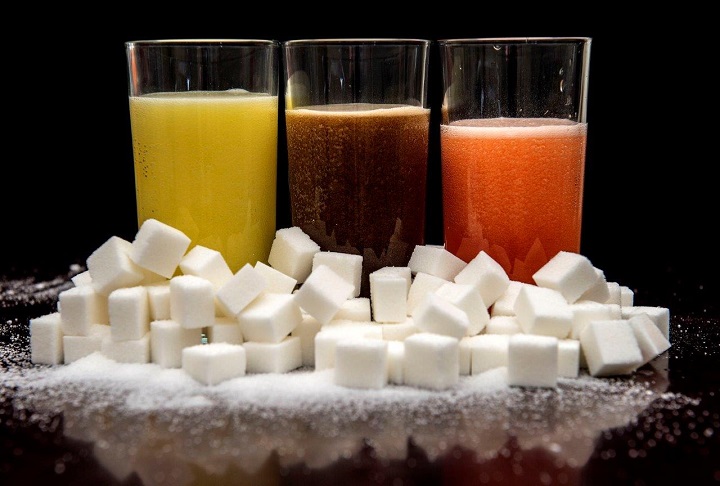With rates of obesity and Type 2 diabetes skyrocketing, health officials around the world are employing strategies to control what the World Health Organization has called “globesity” – the global epidemic of overweight and obesity and its health implications.

The latest target is the consumption of sugar sweetened beverages.
Two new studies with two different approaches are the latest research into solutions of how to curb over-consumption.
When asked by Global News about the research, Canada’s health minister Jane Philpott said in a statement, “I am always interested in reviewing health strategies employed by other jurisdictions and their effectiveness.”
According to the Heart and Stroke Foundation, “sugar sweetened beverages (SSBs) are the single largest contributor of sugar in the diet.” Excess sugar in the diet can lead to excess calories and weight gain.
READ MORE: New advice to Americans: cut back on added sugars, especially in beverages
In Mexico, a 10 per cent tax on sugar sweetened beverages (SSBs) was introduced on Jan. 1, 2014 and within one year there was a 12 per cent reduction in sales, according to researchers.
Close to 70 per cent of Mexicans are overweight or obese with 33 per cent of people aged 2-18 years suffering from obesity.
For the study, an excise tax of one peso per litre was levied on “non-dairy and non-alcoholic beverages with added sugar.” A statistical model was used which adjusted for several influential factors, including age, gender, and socioeconomic situation.
Overall during the study, the average Mexican purchased 4.2 fewer litres of beverages that were taxed. The study was published in the BMJ.
The Mexican researchers said because this is an observational study no definitive conclusion can be made. But they also reported that this change “is moderate but important” and more monitoring is needed “to understand purchases longer term, potential substitutions, and health implications.”
In an accompanying editorial, written by Franco Sassi, a senior health economist at the OECD, he argued taxes can be part of a public health strategy, but they cannot be viewed as a magic bullet in the fight against obesity.
The Canadian Beverage Association (CBA) released a statement about the Mexican study reading “the researchers emphasize that this observational study can reveal no definitive conclusions, and points to other weaknesses such as incomplete data. Taxes on common grocery items like beverages do not improve public health, and Mexico’s experience further proves this point. The study also fails to show that the tax had a meaningful effect on obesity rates or body mass index.”
U.K. and sugar reduction
A second study conducted in the United Kingdom looked at reducing the amount of sugar in beverages, gradually.
Researchers reported by achieving a 40 per cent “reduction in free sugars added to sugar-sweetened beverages over 5 years” it could prevent 300,000 cases of diabetes and 1.5 million cases of obesity in the U.K.
This in turn would prevent between 274,000 and 309,000 cases of obesity-related type 2 diabetes over the next 20 years, the report concluded. The study was published in the Lancet Diabetes and Endocrinology journal.
Sugar sweetened beverages in Canada
Excess sugar consumption is associated with adverse health effects including heart disease, stroke, obesity, diabetes, high blood cholesterol, cancer and dental cavities according to Heart and Stroke.
It recommends Canada adopt a tax on beverages high in free sugars, and that “revenues from such a taxation stream should be used to subsidize vegetables and fruit to make healthy eating more affordable.”
READ MORE: 5% of daily calories should come from sugar: Heart and Stroke Foundation
Canadians total intake of free sugars should not exceed 10 per cent of total daily calorie intake, and ideally less than five per cent, recommends Heart and Stroke.
The CBA said in a statement that over the past decade the industry has “already reduced daily beverage calories by 20 per cent per person, at a time when obesity in Canada has increased.”
It added that the Canadian beverage industry recently set a goal to further reduce per capita beverage calories by another 20 per cent by 2025.
Canada’s health minister Jane Philpott told Global News in a statement, “according to the priorities set out by the Prime Minister in his mandate letter to me, I will be working towards many goals which include new restrictions on the commercial marketing of unhealthy food and beverages to children. I look forward to sharing updates on our progress as we work towards these objectives in my term as Health Minister.”
Heart and Stroke Facts:
- While there are a variety of causes of obesity, researchers speculate that excess caloric intake may be the single largest driver. Larger portion sizes contribute to over consumption of calories and excess body weight.
- Sugar sweetened beverages (SSBs) are the single largest contributor of sugar in the diet. A single 355 mL can of sugar-sweetened soda contains up to 40 grams (about 10 teaspoons) of sugar with no health benefits.
- The total volume of SSBs available to Canadians is 3.5 billion litres, the equivalent of 110 litres per person per year or over 300 mL per day. A standard sized soft drink can is 355 mL.
- As children get older, they consume more sugar from soft drinks. A boys’ average daily consumption of regular soft drinks is 68 grams at ages 4 to 8 years and increases to 376 grams at ages 14 to 18 years. Among girls the increase is from 47 to 179 g.




Comments